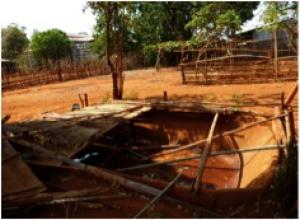Since I’ve been at BGET there has been much variation of projects that I have been involved in. A couple of weeks into working here, we got some great additions to the team for two weeks—a group of students/ world travelers from Western Washington University, high school students from a small island in Washington State, and students from the engineering school in Mae La refugee camp. Our project for that time was to help build a power line to a new training center. The new sustainability training center is on a beautiful property right next to the hills and surrounded by large teak hardwood trees. Being deep in the village and away from the bustling streets of Mae Sot, where BGET’s main office is, was refreshing. I have to say that I really enjoy watching little piglets trotting around and the sound of tiny chicks.
While working on the new training center, we stayed at an orphanage nearby (below, first). It was rejuvenating, staying in such a lively atmosphere of children running around and playing—and most importantly, my wakeup call music of “I’m a Barbie girl” by Aqua played on loudspeaker on one of the girls’ cell-phones. We are all hard at work by day, installing the power line by digging holes for the posts (below, second), clearing land, and building the training center (below, third). By nighttime, we have dance parties with the kids where the sound of the guitar, drums, and keyboard can be heard across the river in Burma. The people that I have met during this trip have been spectacular, especially friends that I have made from Mae La refugee camp engineering school. Their struggles in life really give you perspective on how you are living yours. Mular traveled from Burma 4 years ago and has been in the camp since then. This is the first time in 4 years that any of the students have been outside the fenced camp, yet they are the most optimistic and hardworking people I have ever met. One of them crossed the border and left his family behind with the sole purpose of getting a practical education—he knew for a fact that he would never have the opportunity to go to school in Burma. I was awed by his determination and by the fact that he valued the importance of an education enough to literally cross a mountain, river, and landmines just to sit in a classroom and learn. Really makes me think about all the people that I had classes with in college that fell asleep in the front row during lecture.



The next project that we are in the middle of is developing and implementing a needs-assessment survey for all the 70+ migrant schools in the area. So far, we have visited around 20. The purpose of this project is to compile which schools have energy, water, or sanitation needs and share this study with organizations that work around the area. This will hopefully help organizations prioritize their resources and follow-up on projects that they have already done. So far, the most pressing need for migrant schools that are further away from communities is clean drinking water (see below)—something that we all take for granted sometimes. There is a lot of work to be done and I am happy to be able to help while I am here. The people that I have met here have played a huge part in shaping my experience and I am grateful for that.
 A storage place for water at a migrant school
A storage place for water at a migrant school
